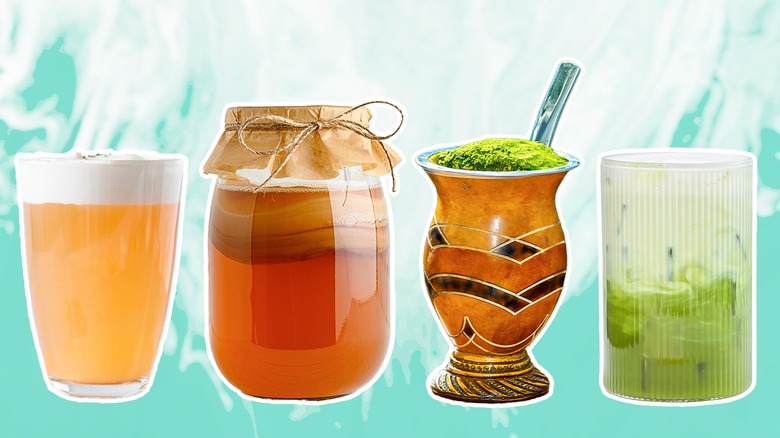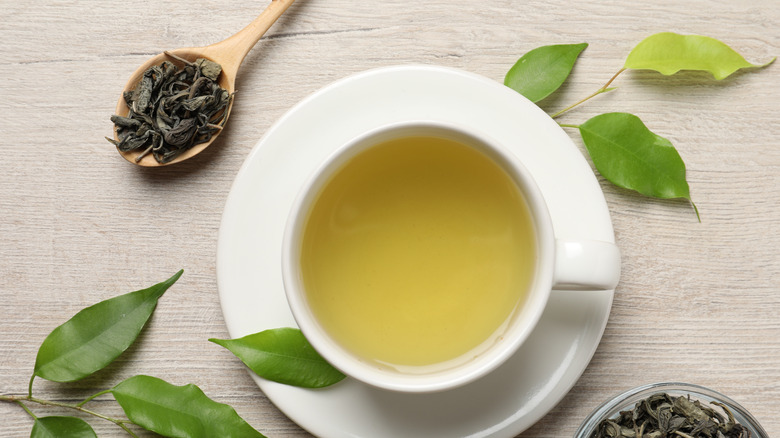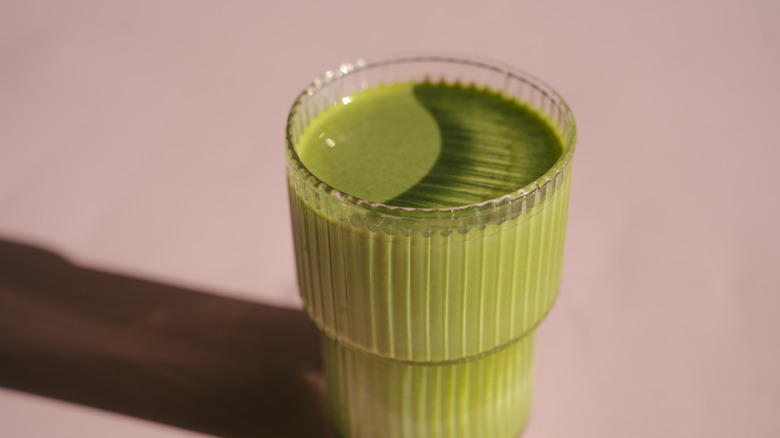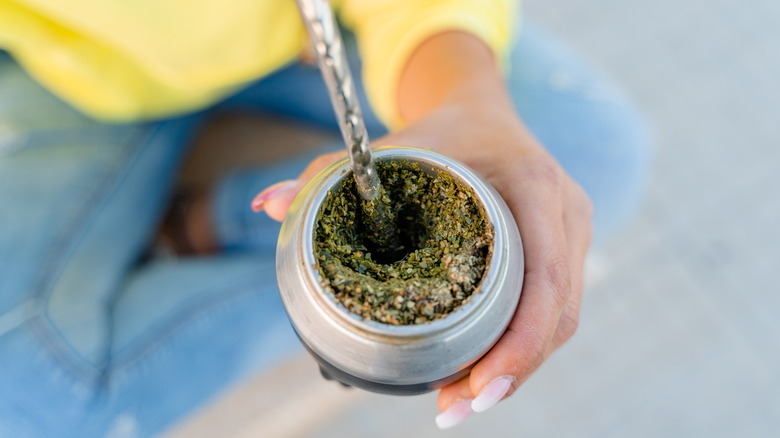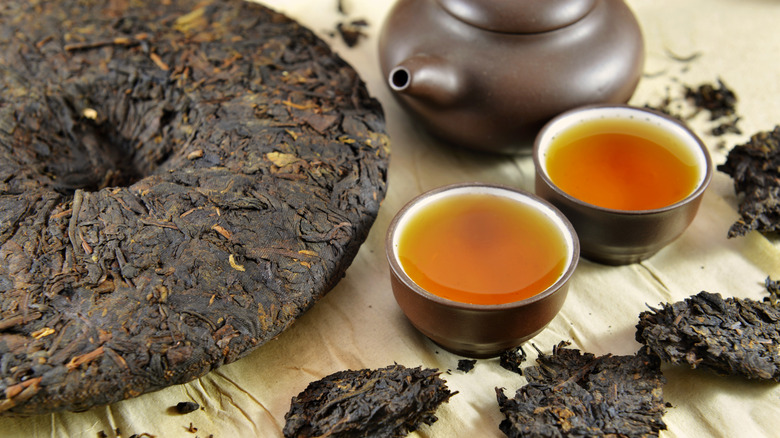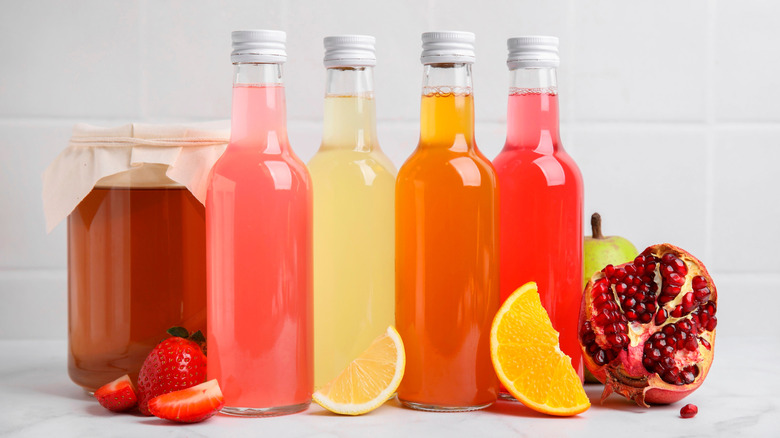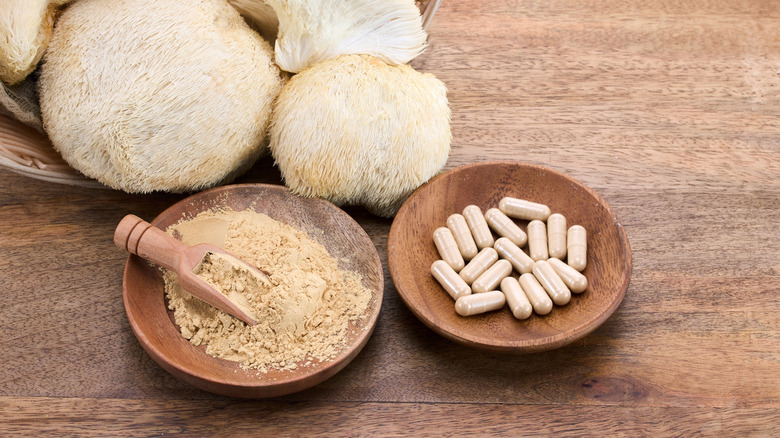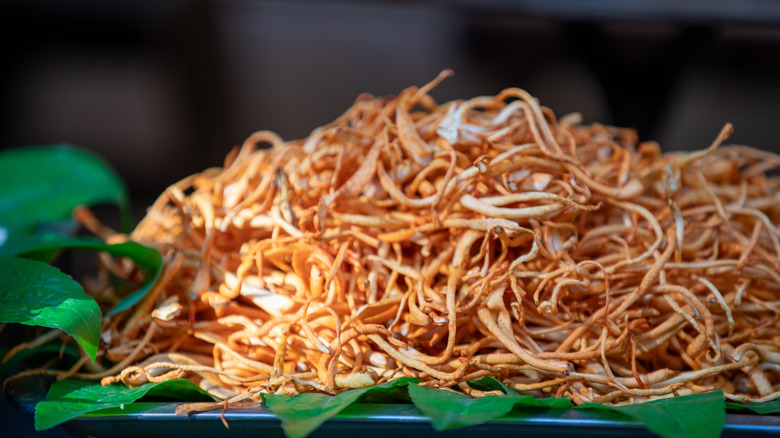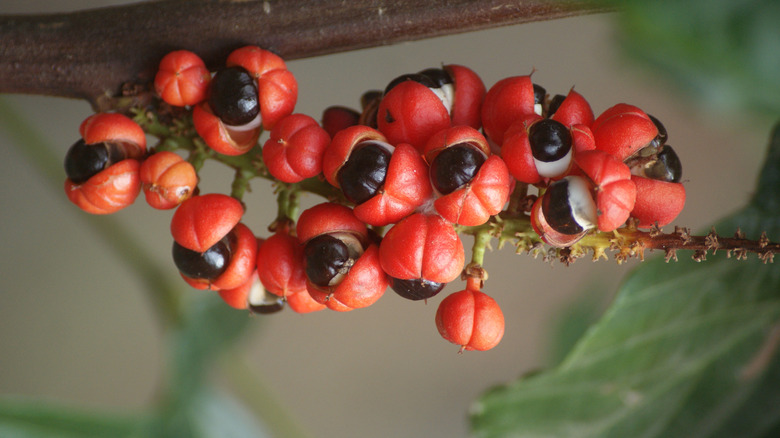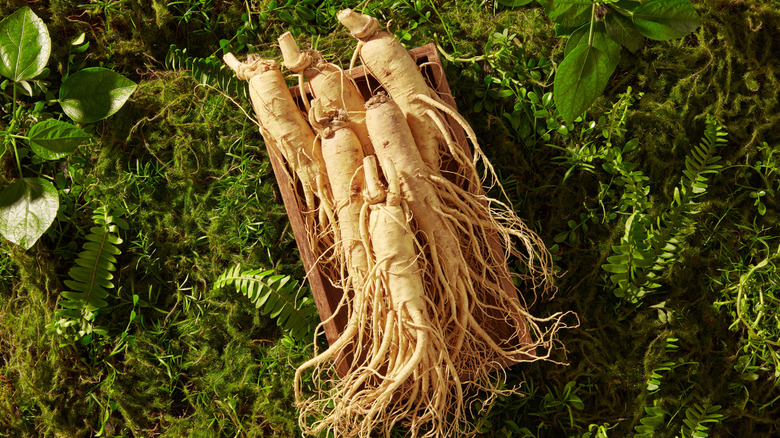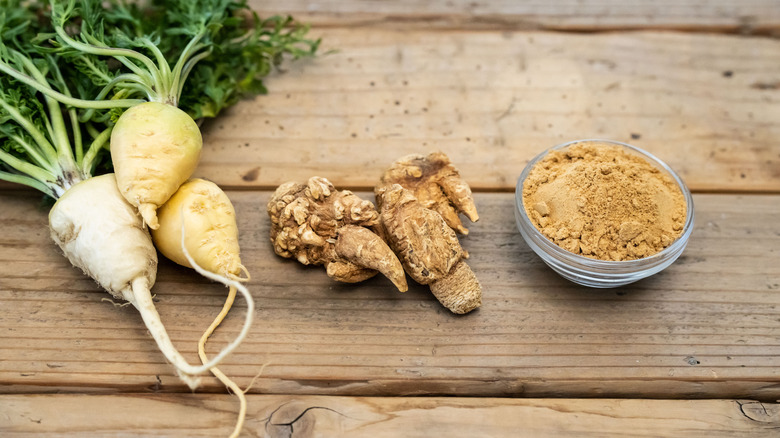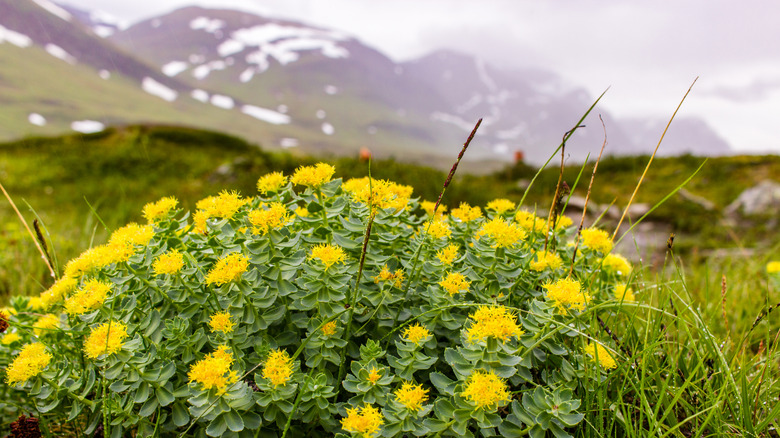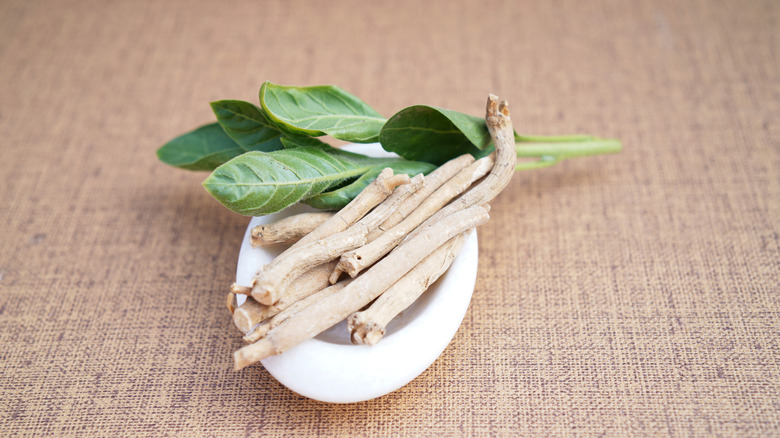Natural Drinks That Give You The Same Boost As Coffee
The gentle bubbling of the coffee maker, accompanied by the unmistakable smell of a good roast, are signs that signify the start of the day for people around the world. But many regular coffee drinkers may have started to notice that their teeth have darkened a few shades, and they can't seem to function at all without that morning cup of joe. If you're exploring alternatives to coffee that will still give you a good burst of energy without the unwanted side effects, this article is for you.
A study published in the National Library of Medicine found that, when consumed in normal amounts, coffee generally supports your overall health rather than harms it. It can be beneficial in aiding digestion, and one study even found that it can help prevent a common form of liver cancer. That being said, for some, the acidity of coffee causes frequent heartburn and even acid reflux. The high caffeine content can become addictive to the point you find yourself with a crippling headache if you miss your morning cup, and the high tannin content of coffee is guaranteed to stain your teeth. Brushing teeth immediately after enjoying a cup may help prevent staining, but if you're not able to find a sink every time you enjoy a cup of coffee then you may want to just explore alternatives.
Oolong, green, and white tea
Perhaps the easiest way to wean yourself off of coffee is by making the switch to tea. Most teas offer a lighter amount of caffeine that will keep you energized without running you ragged. Plus, they're readily available in coffee shops, stores, and probably your friends' houses, offer great health benefits, and tea won't stain your teeth nearly as bad as coffee does — white tea can even improve the health of your teeth as it's a great source of fluoride.
The amount of caffeine in your tea depends on the leaf and how it's prepared. White tea is generally the lowest in caffeine, followed by green and then oolong. Harvard's School of Public Health reports that all of these teas are high in polyphenols, a compound that promotes heart and gut health and reduces inflammation.
If you're more of a straightforward black coffee drinker, you might find a simple cup of hot oolong tea to be the easiest replacement. But for those more adventurous personalities who like to try every different special drink off of the coffee shop menu, tea can be a fun way to experiment and try new flavors. You can use loose leaf tea, tea from concentrate, or simply buy bags. Try adding coconut oil to your tea for an extra boost of flavor and omega-3s, or blend your brewed tea with ice and fruit juice for a refreshing and energizing slushy drink.
Matcha
Whether it's matcha-flavored cheesecakes in a bakery, strawberry matcha lattes at your local coffee shop or even matcha candles in the mall, this tea has become widely known and loved for its grassy, herbal flavor. The downside to its popularity boom is that Japan is having a hard time keeping up with production, and it may become harder to come by as the shortage continues.
It's no wonder matcha has become such a popular alternative to coffee — it boasts an energizing amount of caffeine without the unwanted mood swings. Plus, it has all the antioxidant health benefits that come with drinking tea. It's easy to find in most coffee shops and has a great flavor to boot.
If you're looking for something that packs a bit more punch than green tea, matcha is a great choice. It's easy to whip up a hot or iced latte, sprinkle into a smoothie, or you can even make a matcha butter that goes great in pastries, cakes, or on your toast in the morning.
Yerba mate
You may have noticed colorful cans of this potent tea lining the shelves of your neighborhood grocery store and wondered what exactly it is. Yerba mate is a tea most commonly consumed in Uruguay, Paraguay, Brazil, and Argentina, but has gained popularity since the Guayakí brand made it readily available in cans as a healthy coffee alternative. It packs more antioxidants than green tea or matcha and significantly more caffeine as well.
When canned, yerba mate is often bolstered with caffeine extract and flavored with fruit juices to make it even more enjoyable. The cans are convenient, delicious, and sure to give you a boost of energy, but you can also enjoy yerba mate in its pure form. "Yerba" refers to the plant that creates this wonderful tea, while "mate" refers to the gourd it was originally brewed in years ago. Nowadays, you can purchase a mate cup to brew your tea in, and it comes with a filtered straw that allows you to skip the straining step and sip the brewed tea directly. Yerba tea leaves can be purchased online or in many Latin American specialty stores.
A study in the Annals of Agricultural and Environmental Medicine found that yerba not only gives you a great energy boost, but it can also improve your health in ways similar to coffee: promoting cardiovascular health, weight loss, and protecting your liver cells. So whether you're cracking a cold can or stirring up a hot cup, enjoy the benefits of mate without having to worry about running to brush your teeth afterward.
Pu-ehr tea
This strong black tea has been used for thousands of years in Chinese medicine for its medicinal properties. Pu-erh is unique from other black teas in that it's fermented, which increases the antioxidant levels and contributes to its anti-inflammatory properties. It is important to note, though, that because this black tea is high in tannins it can stain your teeth just like coffee does.
If the teeth staining doesn't bother you, then pu-erh is still a great alternative to coffee as it will give you a more even boost of energy without the jitters, and support immune health.
Pu-erh tea is usually aged for at least a few years and sometimes up to 50, and has different classifications depending on the quality — just like fine wines and whiskeys. The fermentation process gives it a unique earthy flavor unlike any other tea or beverage. This tea can be purchased online, at most tea stores, or at Chinese specialty stores.
Kombucha
You can find colorful jars of kombucha in almost any store, and as it's becomes more popular, even breweries have started offering the fizzy drink as an alternative to beer. While it doesn't generally have enough alcohol to get you drunk, kombucha is a fermented drink that contains small amounts of alcohol, so you might not want to drink it excessively right off the bat.
Kombucha is usually made by fermenting tea, and as it's often black or green tea that's used, kombucha will naturally contain some caffeine. The fermentation process does reduce the levels of caffeine, so don't expect it to give you the same boost as a cup of tea.
The nice thing about fermentation, beyond the carbonation effect, is that it increases the levels of probiotics which are essential for gut health, and there are strong correlations between gut health and energy levels. Ultimately, not that much research has been done into the effects of kombucha on the body, and because fermentation can sometimes yield unhealthy bacteria it's important to only drink it when it's from an experienced brewer.
Mushroom tea
Mushroom coffee has been a hot topic in recent years as more and more products appear on the market advertising the numerous health benefits of powdered mushroom blends designed to give you energy. The thing with mushroom coffee, though, is that it usually is about half coffee combined with powdered mushrooms. So, if you're looking to avoid staining your teeth, look for mushroom tea instead. You can even make this blend yourself by drying and grinding a selection of different medicinal mushrooms.
There are a lot of mushrooms that are used for different medicinal purposes and provide all sorts of benefits, including healthy doses of vitamin D, anti-inflammatory properties, improved liver function, and even hormone regulation. A study by BioMed Research International tested various mushrooms, including lion's mane, chaga, bracket, snow ear, shiitake, and criminis, and found that, although mushrooms don't have caffeine, their numerous health benefits all aid in helping you feel more alert and awake.
If you're wondering what to look for in a mushroom tea, there are many studies showing the benefits of lion's mane in particular. One study conducted by Nutrients, a reviewed journal, found that lion's mane mushrooms can reduce stress and even improve focus. Chaga, which is a mushroom you may recognize as the charcoal-colored lump seen growing on the side of some trees, is another mushroom that is popular in mushroom blends and has been used for ages for its medicinal properties.
Cordyceps
Cordyceps, which sounds a bit like the name of a Pokémon, are often included in mushroom coffee and tea blends, but this fungus is a bit different than its mushroom counterparts. Cordyceps are actually a parasitic fungi that generally grows on the back of insects — sounds appetizing, right? Photos of cordyceps infecting wasps and other insects will make you realize why they inspired the creation of the apocalyptic video game The Last of Us.
But don't let the macabre biology of cordyceps deter you — these fungi are known for their exceptional medicinal properties including fighting fatigue, infections, colds and flus, being anti-inflammatory, decreasing aches and pains, and even helping with altitude sickness.
Consuming any natural substance may have some effect on your teeth, but mushrooms and fungi are a much better alternative to tannin-rich coffee if you're looking to keep your smile bright. You can find cordyceps in many mushroom powder blends, in capsule, powder, and liquid extract form.
Guarana
If you've ever read the label of a Monster or Red Bull, then you've seen the name guarana and probably wondered what it was. While this seed definitely isn't good for your teeth when combined with the carbonation and chemicals of energy drinks, in its natural form, it's just a plant whose fruits and seeds have been consumed for hundreds of years for the energy they provide.
Guarana seeds are prepared for consumption in a similar method to coffee, but they have twice the caffeine content of coffee beans, so you should remember that the daily recommended dose of caffeine isn't more than 400mg and be careful that you're not overdoing it.
Guarana can be purchased in powder, pill, and liquid extract form so that you can easily mix it into juice, a smoothie, or just water. You won't have to worry about staining your teeth, and you can enjoy a smoother but still naturally occurring alternative to coffee.
Ginseng
Ginseng is a root that somewhat resembles a ginger-colored carrot with lots of spindly legs. It has been used in Chinese medicine for over 5000 years and is revered for treating many ailments, including cancer, diabetes, and heart disease. Red ginseng may even help with erectile dysfunction.
Ginseng is often found in tinctures, herbal blends, and teas (although these teas don't usually contain actual tea leaves). All of these products are easy to prepare simply by mixing the ginseng with water. Add a bit of honey and lemon if you want it to have more flavor. They can also be mixed into smoothies and juices for added nutrition and a boost of healthy energy.
The research on whether ginseng improves fatigue is still limited, although a study from Journal of Alternative and Complementary Medicine says that it is a "promising treatment." That being said, the numerous health benefits make ginseng an herb that you should look to include in your diet, as improving your overall health will help you sleep better and feel more rested during the day.
Maca
Maca is sometimes referred to as "Peruvian ginseng" because of the similarities these two roots share. Maca has been used in Peru for thousands of years; Incan people used maca in traditional ceremonies as an aphrodisiac and a source of energy and antioxidants. It's said that Incan warriors relied on maca for energy and stamina.
Maca is another great natural ingredient to include in your diet for its ability to aid your body in converting food to energy and rich antioxidant qualities good for gut health. It's chock-full of vitamins and minerals and can help you feel more energized due to the quantity of B vitamins, which are vital for your bodies ability to produce energy.
Maca has a controversial flavor that some describe as being almost similar to butterscotch, but others find it difficult to swallow. You can always add it to a delicious smoothie to help mask any bitterness, or even look up traditional Peruvian recipes that use beneficial maca root as an ingredient in many recipes. If you don't care to taste it, there are plenty of supplemental products available that go down smoother.
Rhodiola
Rhodiola is an herb that grows in high altitudes and blooms beautiful yellow flowers. Its roots have long been used in traditional medicine, and its young leaves can be cooked and eaten in a similar way to spinach. The root even carries a slightly sweet yet bitter flavor that is occasionally used to flavor vodka, which you can DIY if you're feeling like adding some new infusions to your bar.
A study conducted by Molecules recommends rhodiola to help deal with the symptoms of stress. It can reduce cortisol levels and encourage cell regeneration, making it a viable option to combat the feeling of physical and mental fatigue. It is another example of how caring for your overall health can help you feel more energized throughout the day. This is a great herb to look for in a mix because on its own, it won't combat your fatigue with quite the same efficiency as a caffeinated drink.
Ashwagandha
Ashwagandha is the root of a shrub that can be consumed as a tea in a capsule, powder, or liquid form. It has been used in Ayurvedic medicine — one of the world's oldest medicine systems, for thousands of years.
Because it's been used for so long, the benefits of ashwagandha are widely researched and discussed. It has been found to decrease fatigue, suppress food cravings, and reduce cortisol levels, which is the hormone that is released by the body in response to stress.
Unlike other caffeinated drinks you might consume to keep you awake, taking herbal remedies like ashwagandha will not only decrease your fatigue but could also help you sleep better at night. Several studies have been done in India showing that ashwagandha taken in certain doses improved the sleep of those with insomnia. If insomnia is something you're struggling with, read more about the worst things you can eat before bed that won't help you sleep.
